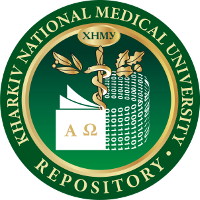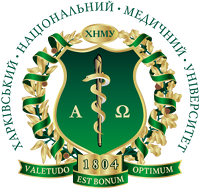Please use this identifier to cite or link to this item:
http://repo.knmu.edu.ua/handle/123456789/3705| Title: | Cytokine agression and heart failure |
| Authors: | Tytova, Ganna Hameed, Mirza Mozgova, Yu. Титова, Ганна Юріївна Mirza Hameed Мозгова, Юлія Миколаївна |
| Issue Date: | Apr-2013 |
| Citation: | Tytova G.Yu. Cytokine agression and heart failure / G.Yu. Tytova, Mirza Hameed, Yu.N. Mozgova // Актуальные вопросы медицинской науки : сборник тезисов научных работ студентов и молодых ученых Всероссийской научно-практической конференции с международным участием, посвященной 85-летию профессора Е. Н. Дормидонтова, Ярославль, 24–26 апреля 2013 г. / Ярославская государственная медицинская академия. − Ярославль, 2013. – С. 87. |
| Abstract: | Heart failure is a complex neurohumoral and inflammatory syndrome. The role of cytokines in the pathogenesis of cardiovascular disease is increasingly evident since the identification of immune/inflammatory mechanisms in atherosclerosis and heart failure. The aim of the study was to examine the features of changing levels of pro-(IL-1β) and anti-inflammatory (IL-4) cytokines in the serum of patients with the progression of chronic heart failure (CHF). A total amount of 48 patients (30 women and 18 men) aged 45 to 78 years with CHF I-IV functional class (FC) on the classification of NYHA. The control group included 24 healthy people matched for age and sex. It was found that the concentration of IL-1β was increased in patients in FC III compared to the control value (49.2%, p <0.001), and also in relation to I and II FC (31.3% and 23.0%, respectively). The level of cytokines was significantly increased with FC IV, differing from that in the control group (77.1%, p <0.001), I (55.9%), in the II (46.1%) and III (18.7%) FC groups. Patients with I and II FC were not significantly different from the control and each other by IL-1β level. The content of the anti-inflammatory IL-4 was the lowest in the serum of patients with FC IV, significantly differs from that in the control group (19.5%, p <0.05) in II FC(16.2%) and III FC(13 , 6%) groups, but did not differ significantly from that of the I FC. Patients of the I, II and III FC in terms of IL-4 did not differ among themselves and from the reference values. The IL-1β / IL-4 ratio which characterizes the balance of pro-and antiinflammatory cytokines were significantly higher than the control in all groups of CHF. The value of this index was lowest in patients of I and II FC. With the progression of CHF value of the index was significantly increased comparing to the control group, the patients I - III FC class respectively. These data may indicate a shift of the pro-inflammatory cytokine network capacity already at the lowest expressed signs of heart failure (I FC), with a further increase as the worsening of the disease. |
| URI: | https://repo.knmu.edu.ua/handle/123456789/3705 |
| Appears in Collections: | Наукові праці. Кафедра внутрішньої медицини № 2 і клінічної імунології та алергології ім. ак. Л.Т. Малої |
Files in This Item:
| File | Description | Size | Format | |
|---|---|---|---|---|
| тези Титовой со студ в Ярославле.doc | 30 kB | Microsoft Word | View/Open |
Items in DSpace are protected by copyright, with all rights reserved, unless otherwise indicated.

